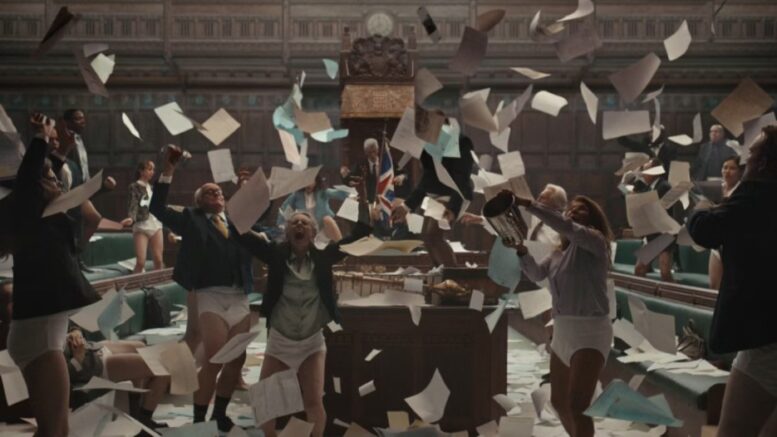Creativity can’t exist without trust.
Creatives need to believe in their process.
Clients need to believe in the creatives.
But how do you get people in business to trust in you?
For this issue of The Business of Creativity newsletter, we asked Katie Jackson, CMO of Channel 4, to answer this question for us…
If people are outraged, you’re probably onto something. Last November Channel 4 released a campaign for its Climate Change season, with a bold film at its heart. The film opens with a gang of executives boarding a private jet. As a voice from the Tannoy system announces that the flight will be a mere 14 minutes, the passengers rip off their suit trousers to reveal white underpants with oil slick skid-marks. They start twerking, and chaos ensues. After that, a similar scene unfolds in a board meeting, and then in a political debating chamber.
The commercial attracted more complaints than any other content on the channel in 2023. It drew ire from groups ranging from MPs to members of Mumsnet. While some found it crude (sorry), it was also among the most audacious and effective ads ever aired. And it makes a simple point. A small cabal of powerful people could do far more with the stroke of a pen than millions of individuals could do in a lifetime.
The secret to creating work like this is trust. When 4creative came up with the concept, we knew it would require a leap of faith. From the Marketing team, from the Comms team, from the legal team, and from our key stakeholders. But that leap of faith wasn’t as difficult as it might have been. Why? Because of the trust built between these teams and the confidence in each other’s expertise.
Relational and Transactional
A trusting partnership is made up of two things. The first component of trust is relational; how your team’s gel on an interpersonal level. When this element is present, you can relate to each other’s worldview, you understand what motivates or frightens each other. The conversation flows simply, and you find each other easy to empathise with. Crucially, you like each other.
The second component of trust is transactional. When this element is present, people pay heed to the professional stuff. Everyone turns up to meetings well prepared and on time, financial commitments are clear, expectations are managed. Work is delivered on time and to the right standard – there is a base level of rigour and competency. When relational and transactional elements are both in place, it’s impossible not to have trust in each other. But beware the pull to prioritise one over the other, they each play their part.
Restoring faith
Where creativity is concerned, we need trust more than ever. In an age where companies are able to measure everything, the will to take a leap of faith is dwindling. Stakeholders by and large want to see the numbers, evaluate the business case, mitigate the risk. The result is expected – because it’s based on what’s gone before – and therefore forgettable. This urge to validate might seem reasonable, until you notice how heavily our society relies on blind faith more generally. Our justice system hinges on hard evidence, but we trust in deeply subjective human juries to brings about a sentence (just have a watch of Channel 4’s The Jury: Murder Trial). Our financial system relies on everyone accepting the value of money (an innately valueless thing). Religion is the epitome of a belief system at odds with objective evidence. We trust banks, institutions, and the state, but where the impact of creativity is concerned, we’re less easily convinced. And this is a grave error.
Trust is an overlooked driver of success. Its component parts – relational and transactional – provide a foundation for provocative, unorthodox and exceptional ideas to flourish. When we were developing the Climate campaign, we knew that the concept itself wasn’t universally liked. But whilst it wasn’t liked, no-one could argue it wouldn’t have the impact we were looking for. Ultimately, your stakeholders don’t have to like your idea. But if they trust and believe in the team, the work will fly.
Written By Sir John Hegarty

